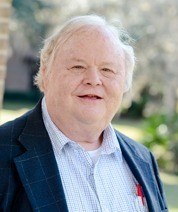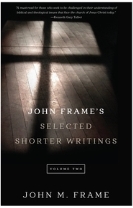John Frame scarcely needs an introduction here. His faithful and distinguished career has been a blessed help to many. As John Piper says of him, “Few in our day champion a vision of God as massive, magnificent, and biblical as John Frame’s…. He brings together a rare blend of big-picture thinking, levelheaded reflection, biblical fidelity, a love for the gospel and the church, and the ability to write with care and clarity.” He has been here with us before, and today he talks with us again, this time about topics raised in his new Selected Shorter Writings, volume 2.
 Books At a Glance (Fred Zaspel):
Books At a Glance (Fred Zaspel):
Welcome back to Books At a Glance! And thanks for talking with us again. Could we begin with some reflections on your own ministry? As a seminary professor of many years, looking back, what have you found most personally enjoyable, and also most valuable, about your work?
Frame:
God has enabled me to work at the job that most perfectly fits my gifts and inclinations. I have loved writing, especially about presuppositional apologetics and perspectival epistemology. And a few other subjects have also attracted my attention, especially worship, since I was a worship leader for about 20 years, and also the biblical standards for ministry and training for ministry.
Books At a Glance:
Have there been any significant shifts in your understanding and or theology along the way?
Frame:
Not really. I can’t say that any of my major views have changed, though all of them have developed with new implications and applications over the years.
Books At a Glance:
You have often expressed concerns with regard to today’s seminaries and the way they approach their work in the preparation of pastors. Would you sketch out for us what, ideally, a seminary should offer its students? What should, say, a young man looking to go into pastoral ministry look for in choosing a seminary?
Frame:
Training for ministry should focus on the actual experiences and skills necessary for pastors: evangelism, counseling, preaching, etc. Some of these skills require academic knowledge, and students should get that — in a classroom, online, or wherever it is best available. That might mean training for a while at a traditional seminary, but it might not. The best training takes place in the context of a church where students can be apprentices to the ministers/elders, and where the ministers/elders can judge their growth in godliness as well as in the knowledge and skills of ministry.
Books At a Glance:
Comparing the average seminary graduate today with the average seminary graduate 30 years ago, what do you find encouraging? And are there areas of concern in this regard?
Frame:
The graduates of 30 years ago had a better understanding of human nature and of how to deal with people of different backgrounds. They also could reason at a more sophisticated level. Today’s grads are better at conventional academic skills, but they are less ready, I think, to take responsibility as church leaders.
 Books At a Glance:
Books At a Glance:
The inspiration, authority, and inerrancy of Scripture has been a common theme in your work. What writers have been most influential in shaping your thinking in this regard?
Frame:
James Packer’s Fundamentalism was the first theological book I read on the subject, and one of the best. Since then, I’ve been deeply influenced by Warfield’s Inspiration and Authority, the various Westminster Seminary symposia on Scripture (most recently, Thy Word is Still Truth), Van Til’s The Doctrine of Scripture and Christian Theory of Knowledge, Meredith Kline’s Structure of Biblical Authority, and Vern Poythress’ books on inerrancy.
Books At a Glance:
You have of course done a good deal of work in philosophy as well as theology, and you have an essay in this book entitled “Why Theology Needs Philospohy” in which you argue that these two disciplines are complementary. Philosophy is not something most of us pay attention to – could you explain for us how it would be helpful for a pastor to be better versed in philosophy?
Frame:
Well, I don’t think every pastor should study philosophy intensively. But such study can be very valuable. For one thing, theology and philosophy are hard to separate in the actual history of thought. The two disciplines influence one another, and they are often indistinguishable. Further, philosophy deeply influences the developments of culture which God calls pastors to address.
Books At a Glance:
Do you have any new books you plan to publish soon that we can be watch for?
Frame:
My Apologetics to the Glory of God is being re-edited with a different title and some new material by my good friend Joe Torres. That should be ready this year. Then my History of Western Philosophy and Theology should be released in Nov., 2015. And, yes, there will be a Selected Shorter Writings 3, probably sometime in 2016.
Editor’s Note: You may also like to see our previous interviews with John Frame here and here.

